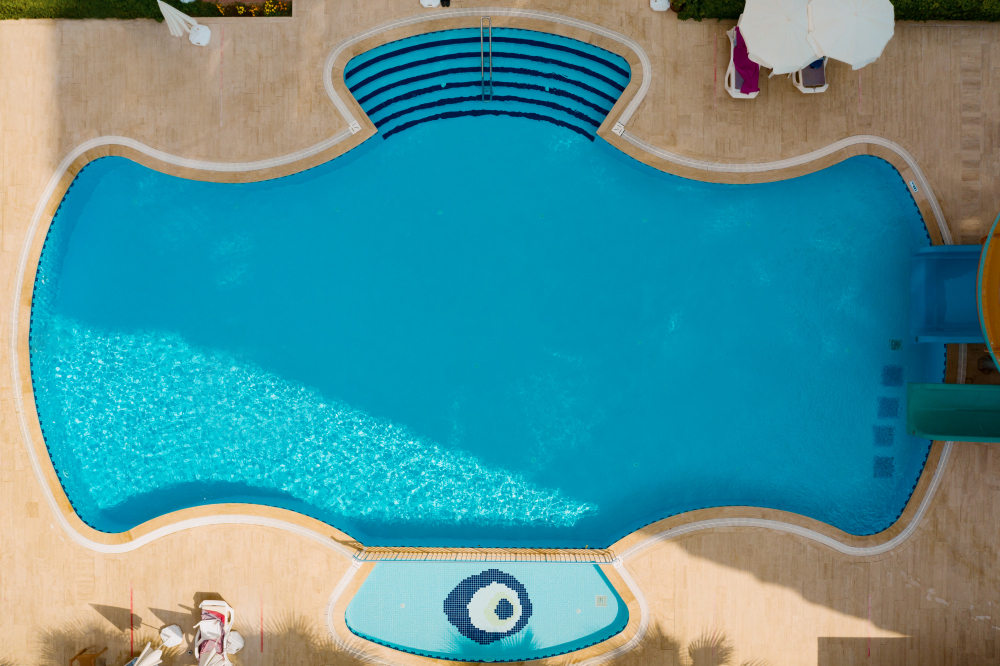The best pool shape for a backyard depends on your space, usage, and style. Rectangular pools are practical for swimming laps, while freeform and kidney shapes work well for natural aesthetics or compact areas.
In the United States, residential pools represent a $1.3 billion industry, with over 10.4 million households having a pool. This guide explores key factors, popular designs, and practical tips to select the best pool shape for your needs.
Factors to Consider When Choosing a Pool Shape
Backyard Size and Layout
The size and layout of your backyard significantly influence pool shape options. Rectangular pools are ideal for narrower spaces, while freeform designs fit irregular or expansive areas. The average U.S. residential lot measures about 8,177 square feet, requiring efficient use of available space.
Intended Use
How you plan to use the pool plays a major role in shape selection. Rectangular pools are perfect for swimming laps, while circular designs work well for leisure and social gatherings. Recent surveys show that 40% of pool owners prioritise recreation, while 36% focus on fitness.
Budgetary Constraints
Certain pool shapes affect construction costs. Freeform pools, which often require customised excavation, can cost 15–25% more than standard rectangular designs. Geometric shapes, however, are simpler to build and more budget-friendly.
Aesthetic Preferences
Your choice of pool shape impacts the visual appeal of your backyard. Rectangular pools provide a clean, modern aesthetic, while kidney or freeform designs blend seamlessly with natural landscaping. 62% of homeowners opt for designs that harmonise with their yard’s existing elements.
Overview of Popular Pool Shapes
Rectangular Pools
Rectangular pools are a classic and versatile option. They are particularly suited for lap swimming and are compatible with automated pool covers, which are used in 45% of new installations in the U.S. However, their formal appearance might not complement backyards with organic landscaping.
Freeform Pools
Freeform pools mimic natural bodies of water with curved edges and irregular shapes. About 25% of homeowners prefer this style for its ability to blend into lush or tropical settings. These pools can, however, require more complex construction and higher costs.
Kidney-Shaped Pools
Compact and practical, kidney-shaped pools allow for separate zones, such as seating and play areas. Popularised in the mid-20th century, they are still common today, with around 12% of installations adopting this design.
L-Shaped Pools
L-shaped pools combine functionality with aesthetic appeal, offering distinct areas for relaxation and swimming. They are ideal for corner lots but account for just 8% of installations due to their larger space requirements.
Circular or Oval Pools
These shapes are efficient and more commonly seen in above-ground designs, which comprise 41% of residential pools in the U.S. Their simplicity makes them suitable for smaller spaces, although they limit functionality for structured activities like lap swimming.
Geometric Pools
Geometric pools feature angular lines and a contemporary appearance, making them popular in modern homes. Roughly 10% of pools fall into this category, with customisable layouts often incorporating infinity edges or sharp designs.
Plunge Pools
Plunge pools are compact designs that fit well in urban settings with limited space. Averaging 10 x 20 feet, they are ideal for cooling off and relaxing but not designed for vigorous swimming.
Pool Shape and Climate Considerations
Hot Climates
In warmer areas, such as the southern U.S., pools with larger surface areas, like freeform designs, help maximise cooling. These shapes are popular in regions where summer temperatures exceed 90°F.
Cold Climates
Rectangular pools are a practical choice in colder climates. Their uniform design simplifies covering during the off-season, and 70% of pool owners in northern states use pool covers to reduce winterisation expenses.
Windy Areas
Kidney-shaped or geometric pools are better suited for windy regions, as their smaller surface areas reduce debris accumulation. Coastal homeowners often favour these shapes for easier maintenance.
Shady or Sunny Yards
Rectangular pools are easier to align with the sun, aiding natural heating in sunny areas. Meanwhile, freeform pools work well in shaded backyards, designed around trees or existing structures.
Customisation Opportunities with Pool Shapes
Integrated Features
Popular shapes can accommodate built-in elements like tanning ledges or play zones. Surveys indicate that 35% of pool buyers enhance their designs with these additions for increased functionality.
Water Features
Geometric pools pair effectively with waterfalls and fountains, creating a striking aesthetic contrast. About 28% of U.S. homeowners include at least one water feature in their pool designs.
Decking and Coping
Freeform pools often integrate natural stone coping and textured decks, complementing their organic design. Conversely, rectangular pools frequently feature sleek, modern decking materials. 60% of installations use concrete or composite materials for their decks.
Lighting Options
LED lighting enhances various pool shapes. Circular pools benefit from centralised lighting, while freeform designs use perimeter lights to highlight curves. 48% of pool owners report that lighting features improve nighttime use.
Practical Tips for Finalising a Pool Shape
Collaborate with Professionals
Experts help match pool shapes to yard space and preferences. Research shows that 85% of homeowners consult professionals for design input.
Visualise the Design
Using software or templates, you can preview how a pool will fit in your backyard. Around 60% of design firms now offer 3D renderings to assist in this process.
Consider Long-Term Maintenance
Certain shapes, like freeform or kidney pools, may require additional upkeep due to irregular edges. Rectangular pools, which are simpler to clean, remain a preferred choice for their practicality.
Test the Layout
Mark the pool’s dimensions using stakes or rope to understand its spatial impact. This step, widely recommended by contractors, helps homeowners optimise layout decisions.
Not sure which pool shape suits your space? Call (770) 771-1839 for Expert Advice!

